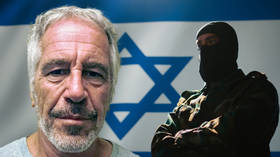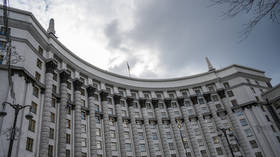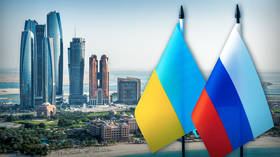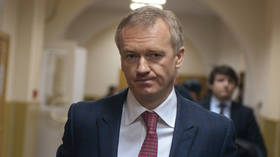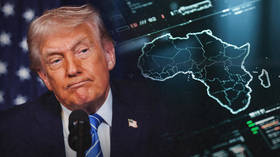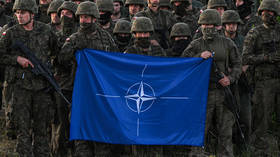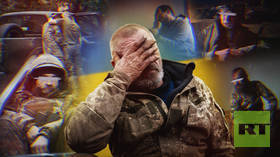Ukraine’s two-fingers to freedom of expression
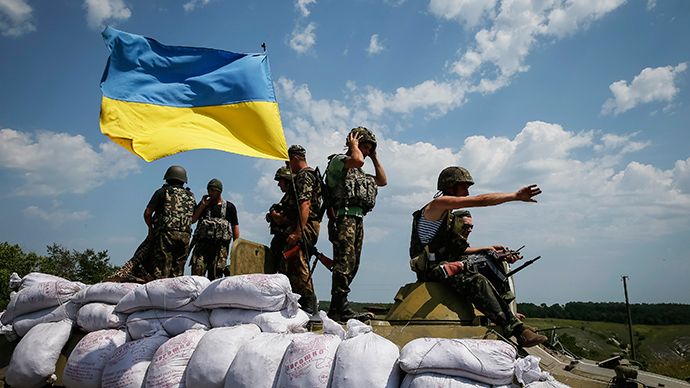
Kiev’s move last Friday to deport the British freelance journalist, Graham Phillips, sets a dangerous precedent - one that his colleagues would be wise to challenge.
A line from the hit TV series Father Ted springs to mind. The eponymous central character has been accused of being a fascist due to a misunderstanding with a member of the Chinese community and replies “I’m not a fascist. I’m a priest. Fascists dress up in black and tell people what to do. Whereas priests…. more drink?”
I mention it because, since the collective delusion of ‘Euromaidan’ kick-started a revolution that imposed a US-backed government on most of Ukraine, a common accusation from opposing voices has been that the new regime harbors many of fascist inclination. Kiev has consistently denied this, despite considerable evidence to the contrary, and attempted to paint a picture of a forward-looking, European orientated administration that aspires to EU values and eventual membership.
The Berlin declaration of 2007 outlines what Brussels considers to be European values: “The individual is paramount. His dignity is inviolable. His rights are inalienable. We are striving for peace and freedom… We stand up for liberties and civil rights and also in the struggle against those who oppose them.”
Much of what is currently happening in Ukraine breaches every tenet of those European values. Indiscriminate shelling of civilian areas, the ouster of an elected government by force, the treatment of southeastern Ukrainians as second-class citizens and rise of anti-Russian racism are cases in point.
Most of the Western media covering the crisis has taken an unabashedly pro-Maidan line from the outset – with some significant exceptions – and has either turned a blind eye or under-reported atrocities carried out by the regime.
The Odessa massacre is an example as is the horrific murder of civilians in Gorlivka at the weekend. When snipers were allegedly used at Maidan earlier this year (it’s still unclear which side they were on) it made front page headlines across Europe, with blame automatically apportioned to the previous government of Viktor Yanukovich.
When southeastern Ukrainians are butchered by Kiev’s military, it barely merits a mention, if at all, in most Western outlets. However, if Russia so much as sneezes these days, by the time news reaches Washington or London, it has turned into an outbreak of the plague.
Last Tuesday night, a British journalist working for RT was captured by Ukrainian forces following a battle at Donetsk airport which he was reporting on. An ANNA news agency cameraman was also seized. Graham Phillips’ detention was barely reported in his home country and his subsequent deportation has also hardly been mentioned.
Some of his colleagues used Twitter to register their anger at his treatment, but few of them covered the story in their publications or broadcast outlets. Others didn’t refer to Graham’s case at all and, shamefully, a small few even publicly took joy from it. To be fair, those in the latter category are not in Ukraine and did so from the safety of the United States, where they earn their keep from funds stolen from the Russian taxpayer.
I have to declare an interest at this point in that I first encouraged Graham to sell his videos to the Dublin-based agency Storyful last winter, and I mentored him considerably in finding media organizations willing to ‘buy’ his work, among them RT. I also consider him a friend.
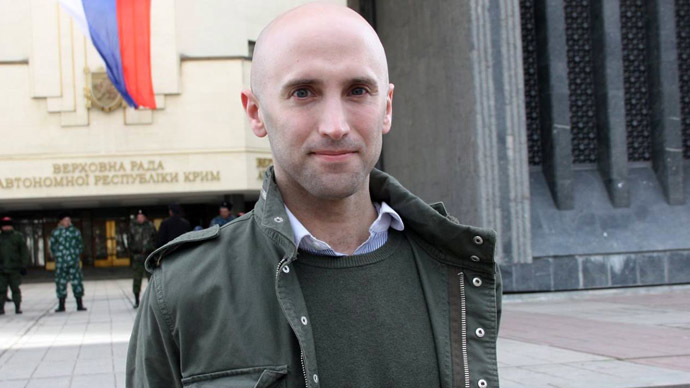
Graham's story in Ukraine
Phillips has been a divisive figure since he first emerged on the scene earlier this year, largely through his reports for RT but also because of his extremely popular YouTube channel and his blogs. Some have accused him of being careless with facts and others have scolded the Brit for taking a strong anti-Maidan position from the outset, in stark contest to London's official line.
Many of the concerns are justified, but few sane people believe that Graham has deliberately tried to mislead – rather his errors have been down to his inexperience and the ‘fog of war’. Many very established correspondents also made glaring errors in Ukraine – it is part and parcel of the 24 hour news cycle in a time of such tumult. There is also the point that both sides in the conflict have a reputation for bending the truth and it is hard to know who to believe.
Even Phillips’ biggest detractors admit that at times during the conflict his reportage has been useful and of considerable merit, in fact on many occasions he has been the only foreigner at the scene of some of the war's biggest events. Such as on April 12, when the ‘Siege of Slavyansk’ kicked-off, and the RT stringer and his fellow British freelance who was reporting for Mashable, David Patrikarakos, were the first foreign journalists on the scene. Through a little good luck and considerable bravery, the two were able to shine a light on Slavyansk, a city few outside Ukraine had even heard of up to that point. After the latter returned to Kiev, Phillips stayed alone in the city. That took guts.
Some accused Graham of becoming too close to the self-proclaimed ‘People’s Mayor’ Vyacheslav Ponomarev and others have, rather ludicrously, claimed that he abetted the shameful detention of the Israeli-American journalist Simon Ostrovsky in mid-April.
Phillips explains that he has regrets about what happened in Slavyansk and he probably should have kept a larger distance from Ponomarev: “It was an electric time to be there but if it came again, I guess I wouldn’t feel quite the same as I have been through a few similar things since.
“I think I got pretty close to him (Ponomarev) but overall I felt that being close to him helped get better stories through the access it facilitated,” he adds.
Isn’t it fair to say that Phillips was trying to make a name for himself and may have overblown some incidents? “I think as a journalist, it is okay, even healthy, to want to make a name for yourself. If you do a good story, you want it out there to the right people, for it to find an audience,” he counters.
As he was reporting news that was deeply unpopular with the Ukrainian Nationalists, attacks on Graham by pro-Kiev internet trolls heightened, while calls for his removal from Ukraine intensified. His gonzo-style reports and criticism of the original Maidan protests and subsequent US-backed regime were being cited online as being ‘anti-Ukrainian’ and Twitter users were openly calling for his capture.
One user in Dnepropovetrovsk apparently placed a $10,000 bounty on his head – unverified, but in today’s lawless Ukraine, who knows? In a few months, Graham had gone from being a relatively anonymous blogger and teacher, based in Odessa, to a Kim Philby or Lord Haw-Haw figure in the eyes of many on the Maidan-side. However, he had previously worked in journalism for a Kiev-based magazine and an abortive news start-up so he wasn't a total novice.
On May 20, Phillips was picked up by forces loyal to Kiev outside Mariupol and taken into custody. Following his release, without charge, he left the country to take a pre-planned trip to the World Cup in Brazil.

‘Worst is to get in the club’
During the period when he became a target of hate from one side, and a hero to many on the other, how did other Western journalists treat him?
“Journalists tend to get into huddles at press conferences and cliques are fairly noticeable. I remember one well-known American journo not speaking to me and then being on the phone and saying pretty haughtily that ‘RT are here’ and looking through me.
“If you work with RT or any non-Mainstream media you are definitely not the in ‘clan’ of Western correspondents, but then you realize that it doesn’t mean anything anyway - in fact, the worst thing to do is get in the club, in my experience.”
“Some are very nice it must be said. One fellow Brit had an issue with RT, she made that clear, but after she’d made her point, we got on really well. I understand her position is quite different to RT’s but I really like her as a person,” he illustrates.
Phillips returned to the UK following the World Cup and after a brief stay with family, drove back to Ukraine, crossing continental Europe and entering via the Polish border. Euromaidan PR activists warned that his life was in danger in Ukraine and some, on Twitter, openly called for his execution. Nevertheless, Graham continued to Donetsk and on his second day back at work he was captured by Kiev troops after he recklessly got caught in a firefight at the city's airport.
One (foreign) Euromaidan columnist reported on Twitter that the journalist had been killed by a landmine at the scene and posted a RIP notice. His tweet caused alarm due to the fact that nothing was heard from Graham during his detention, and even the UK government was unable to confirm his location.
Last Friday, after three days in captivity, he was told that he was banned from entering the war torn country for a period of three years for threatening the ‘“territorial integrity and security of Ukraine.” He was then dumped over the Polish border, from whence he had come almost a week earlier. His car and some personal effects are missing.
Around the same time that Kiev media reported his ‘conviction’ in a road-side Kangaroo Court, his Facebook and VKontakte profiles started posting pro-regime propaganda. The following morning his Twitter account (with over 14,000 followers) began doing the same.
Phillips, and most of his supporters, are convinced it was the work of the SBU (Ukraine’s secret service). “The worst of it all was the hacking really. They wiped my computer and countless videos were deleted and family photos. I’d just been to see my Great Aunt in Britain, she’s 90. All those photos with her, that mean a lot, were deleted by the SBU,” he says.
For a government which aspires to eventual EU membership, as much of a fantasy as that may be in today’s crisis-ridden union, to behave as Kiev has towards Philips is rather incredible.
Booting a foreign journalist from the country on trumped up charges is an obvious two-fingers to freedom of expression and runs completely contrary to the European Values that I mentioned at the outset.
To then stoop so low as to hack his private social network accounts to post pro-regime propaganda is childish at best and a serious violation at worst. One Twitter user tweeted me to exclaim: “They kidnap a Brit journalist and scribble rude messages on his Facebook account. Kiev is not a government, it’s a chimpanzee's tea party.” (I’ve edited it for reasons of grammar). It’s hard to disagree with the sentiment.
Even more alarming is the paucity of the response by Phillips’ colleagues in the Western media, particularly his fellow Brits.
While they may consider Graham a ‘special case’ because he worked for a Russian outlet, and Russia is perceived by Kiev to be an enemy currently, their laissez faire attitude might yet come back to bite them. If Poroshenko’s regime can toss out a UK subject, because he reported for RT, and get away with it, what stunt will they attempt next?
Will any journalist refusing to regurgitate their propaganda be targeted? Or anyone who questions their version of events?
Not to mention that some Western journalists have privately told me that their work is being routinely censored and that some wanted to highlight the RT stringer's case, but were rebuffed by their news-desks back home. One British journalist confided that they recently changed employers due to continuous refusal to publish the truth about the Ukrainian crisis by their previous editors. Anything remotely sympathetic to the rebel position was removed and only pro-Kiev reportage was acceptable.
What happened to Graham Phillips in Ukraine is a thundering disgrace, it was a deliberate attempt to silence a dissenting voice and coverage of the civil war is now poorer as a result. It was also an attack on the individual’s right to expression and on the wider media itself.
But Kiev’s leaders are ‘Europeans’ and don’t have any authoritarian or extremist characteristics according to their official line. Of course, “fascists…. tell people what to do. Whereas Kiev (sic)…. more drink?”
The statements, views and opinions expressed in this column are solely those of the author and do not necessarily represent those of RT.
The statements, views and opinions expressed in this column are solely those of the author and do not necessarily represent those of RT.



